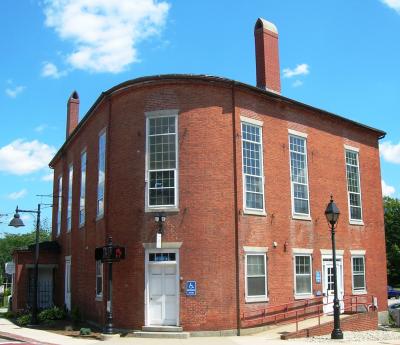-
Our Community
-
- Welcome Visitors About Durham's Community Climate Remembrance Project Diversity Welcome Statement Life in Durham Places to Stay Places to Eat Places to Park Transportation Schools Oyster River School District Welcome New Homeowners
- Durham Public Library Programs & Events Trails and Town Lands Conservation Commission Land Stewardship Conservation Lands & Parks Conservation Easements Trails Youth Organizations University of New Hampshire Durham Preservation Durham Historic Association
- Volunteer Town of Durham Land Stewardship Public Library UNH Cooperative Extension Churchill Rink Parks & Recreation Recreation Program Calendar Outdoor Recreation Activities Outdoor Recreation Sites Sustainable Durham Recycling Information Swap Shop Information Earth Day 2023
-
- Doing Business
-
Inside Town Hall
-
- Departments Assessing Building Business Office Code Enforcement Information Technology Planning Town Clerk/Tax Collector Parks & Recreation Boards, Commissions & Committees Agricultural Commission Conservation Commission Historic District/Heritage Comm. Other Boards & Committees Planning Board Zoning Board
- DCAT Media Productions DCAT Media - Programming DCAT Media Livestream Zoom Video Meeting Schedule Town Council Town Administration Public Hearings Public Safety Police Fire McGregor Memorial EMS (Ambulance)
- Public Works Engineering Division Operations Division Sanitation Division Water Division Wastewater Division Stormwater Town Directory Telephone Directory by Department Services Directory
-
-
Helpful Resources
-
- Quick Links Assessors Online Database Bids and RFP’s DCAT Media Productions GIS Digital Maps Jobs Online Services Parking Information Social Services Town Holidays Trash Pick Up Holiday Schedule Transfer Station & Recycling Center Information Curbside Refuse Collection by Street Zoom Video Meeting Schedule
- Town Documents Budget & CIP Forms & Applications Master Plan Tax Increment Finance (TIF) Districts Tax Maps Town Charter Town Code Town Reports Town Wide Master Fee Schedule Zoning Ordinance Voter Information
- Contact Us Cemetery Information Social Media Facebook Twitter Town Newsletter Friday Updates Town Meetings & Events Agenda and Minutes Calendar Public Hearing Notices State & U.S. Representatives
-
About
Historic District/Heritage Commission
The purpose of the Historic Overlay District (HOD) Ordinance and the establishment of the Historic District/Heritage Commission is to preserve and promote the historic, cultural, educational, economic, and general welfare of the community by:
A. Protecting and preserving structures, places, and properties that reflect elements of the cultural, social, economic, and political heritage of the town;
B. Promoting the preservation, restoration, rehabilitation, and adaptive reuse of structures and places of historical, architectural, and community value as well as vistas of significance within the HOD;
C. Conserving property values in the HOD;
D. Protecting and enhancing the attractiveness of the HOD;
E. Promoting the use of the HOD for the education, pleasure, and welfare of the citizens of the town.
HISTORIC DISTRICT COMMISSION AND HERITAGE COMMISSION
The Historic District/Heritage Commission (or simply “commission”) is one unified body that fulfills the responsibilities of both a historic district commission and a heritage commission as specified under state law. When performing the duties of a historic district commission, the commission is referred to as the Historic District Commission or the HDC. When performing the duties of a heritage commission, it is referred to as the Heritage Commission. The commission consists of seven members all of whom are residents of the Town of Durham. One member is a member of the Town Council and one is a member of the Planning Board. Members serve three-year terms. The commission meets on the first Thursday of each month at 7:00 pm in Town Council Chambers, unless there is no business to conduct.
The Historic District Commission reviews applications within the Historic Overlay District (“Historic District”) approving, approving with conditions, or denying applications, as appropriate.
The Heritage Commission has a broader role in promoting historic preservation in general. Pursuant to RSA 674:44-b, the Heritage Commission may:
1. Call upon Town staff, citizens, abutters to applicants, and professionals, as it sees fit, for input, consultation, and recommendations on matters before the Commission.
2. Conduct small area or community-wide surveys of historic, architectural, and cultural resources.
3. Nominate structures and districts for listing in the New Hampshire State Register of Historic Places and National Register of Historic Places and review all proposed National Register nominations within the Town; keep a record of all properties that are included in local historic districts, listed in the National Register, or determined eligible for National Register listing.
4. Prepare historic resources sections of local master plans and ensure that the impacts on historical resources are considered at every level of local decision-making.
5. Advise other local, state, and federal government entities about historical, architectural, archeological, and cultural resources, and advocate for the identification, protection, and preservation of these resources.
6. Consult on applications for zoning amendments, variances, conditional uses, and other approvals affecting property in the Historic District; consult on these applications affecting property located outside of the Historic District when deemed appropriate.
7. Investigate and recommend to the Planning Board and Town Council amendments to this ordinance (Article XVII)
8. Investigate and recommend to the Planning Board and Town Council new areas for designation as historic districts.
9. Act as a liaison between local government and individuals or organizations concerned with historic preservation.
10. Educate municipal officials, historic district property owners, owners of other historic properties, and the general public about the historic district and historic preservation in general.
11. Participate in informational, advisory, and policy setting meetings about historic preservation issues, historic district commissions, heritage commissions, and the Certified Local Government program of the National Park Service.
12. Develop and administer a system of markers and monuments recognizing individual properties in the historic district; acknowledge special contributions toward historic preservation by members of the community.
13. Coordinate with other Town boards in the review of items such as lighting or parking areas that might also be subject to review by those boards.
14. Undertake any other appropriate action or activity necessary to carry out its mission as embodied in this section.


